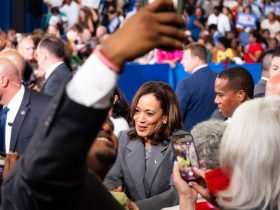MILWAUKEE — Republicans have provided very little unwanted drama at their convention this week, and Donald Trump has enjoyed every adulatory minute of it. But away from this convention city, Democrats have provided some drama of their own, likely to the detriment of President Biden.
Democrats have unwittingly flipped the script of convention week, which traditionally has called for some modest counterprogramming by the opposing party or, long ago, simply going quiet for the entire week. Biden certainly tried to counter Trump, holding campaign events in the critical state of Nevada and conducting an interview with NBC anchor Lester Holt.
But his efforts have had to compete with the steady drip, drip, drip of the saga of whether he should continue his candidacy or bow out gracefully and a messy discussion about whether he should be nominated ahead of next month’s Democratic convention in Chicago.
And then on Wednesday, the White House announced that the president had tested positive for covid, forcing him off the campaign trail to isolation at his home in Delaware.
As befits convention week, Trump has been the dominant story, and it has been almost uniformly good. Republicans at this convention are as united as anyone can remember — united around Trump’s candidacy, his persona and his policies.
Since the assassination attempt on Saturday, Trump has been visible but not volatile. So far, he has been on good behavior, basking each night in the family box just above the convention floor. How long even-tempered behavior lasts is the question that even many Republicans are asking and with some urgency as he prepares to address the convention on Thursday night.
His nightly arrivals at the Fiserv Forum have provided the emotional highlights of the week. Gov. Sarah Huckabee Sanders of Arkansas said when she saw video of Trump walking in for the first time on Monday night, she rushed from a nearby holding room to the convention to witness it firsthand, such is the draw he holds on those who count among his most loyal supporters.
But if Trump has been the obvious big story of the week, Biden has been a story of a different sort. It has now been three weeks since the CNN debate in Atlanta, and the Democrats seem no closer to answering the question of will he stay or will he go.
The calls for him to withdraw began in the hours after that debate and have persisted. But he remains in the race, resistant to all the public and private advice that he threatens to take the party to a defeat that could cost the House and Senate as well as the White House.
The latest turn in that story is the revelation that Senate Majority Leader Charles E. Schumer (N.Y.) and House Minority Leader Hakeem Jeffries (N.Y.) separately have told Biden that his continued candidacy would imperil the party in the fall, putting at risk Democrats’ hopes of taking control of the House and handing Republicans control of the Senate.
Rep. Adam Schiff (D-Calif.), his party’s nominee for Senate, became one of the most prominent Democratic elected officials to urge Biden to step aside when he did so on Wednesday. Schiff’s words carry weight, given his prominence in the party, but the fact that he is extremely close to former House speaker Nancy Pelosi (Calif.) has given those words even more meaning.
Midweek, the party found itself in a messy internal squabble over the issue of formally nominating Biden and Vice President Harris weeks before the convention. Party officials say the move is necessary to ensure that Biden and Harris are on all state ballots and avoid litigation over access. Other officials say that’s folly and that an early vote isn’t necessary.
Part of the debate this week was over when to schedule the roll call, and when it looked like those in control were preparing to set the date at the end of this month or earlier, congressional Democrats and Democratic governors pushed back. Now party officials say the virtual roll call will not be held before Aug. 1, perhaps even a bit later.
That almost assures that the Democrats’ drama will continue until then, unless Biden suddenly announces a change of heart. He has rebuffed all calls for him to step aside, has retreated to what is described as a shrinking inner circle of advisers and remains confident in his ability to win the election even if two-thirds of Democrats nationally say he should pass the torch, according to a new AP/NORC poll.
The covid diagnosis adds to Biden’s string of bad luck, possibly drawing more attention to his age and physical strength. Since the debate, he has stepped up his schedule and his travels, holding rallies, doing interviews and conducting Zoom conversations with different groups from his party.
At times, he has been vigorous and energetic. At other times, not so. Even at his best, he has not put to rest concerns about his capacity to win the election and serve another four years.
Veteran Democrats are in a dour mood but want to believe there are more turns of the wheel to come, something unexpected that could move the race away from Trump and back toward them.
Wiser Republicans, trying to temper their optimism, recognize that the election is still almost four months away. But the Democrats’ travails that have played out this week have only added to the confident mood that has marked the first days of the Republican convention.








